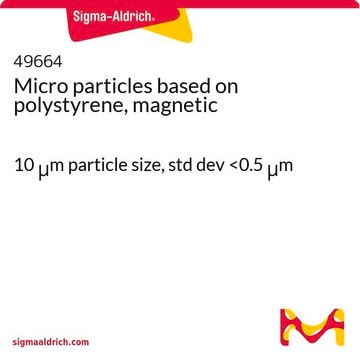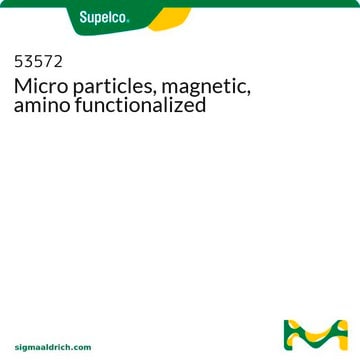00239
Micropartikel, magnetisch, carboxylat-modifiziert
Synonym(e):
Magnetische Micropartikel, carboxylat-modifiziert
Anmeldenzur Ansicht organisationsspezifischer und vertraglich vereinbarter Preise
Alle Fotos(1)
About This Item
UNSPSC-Code:
41116107
NACRES:
NA.25
Empfohlene Produkte
Qualität
analytical standard
Qualitätsniveau
Beschreibung
particle mass concentration 18 - 22 mg/mL
bp
212 °C
mp (Schmelzpunkt)
32 °C
Anwendung(en)
glass & ceramic
industrial qc
pharmaceutical
Format
neat
Lagertemp.
2-8°C
Verwandte Kategorien
Allgemeine Beschreibung
Carboxy functionalized magnetic microparticles are a particle size standard, designed for profiling particle size distribution (PSD) of test samples.
Anwendung
Used for equipment particle size calibration.
It can also be used to:
It can also be used to:
- study biochemicals and reagents as well as magnetic microparticles.
- better understand the mechanism by which toxic airborne particles can affect cardiovascular function.
Leistungsmerkmale und Vorteile
- suitable for routine instrument calibration checks, testing and corrections
- available in 10 mL pack size as a neat sample
Lagerklassenschlüssel
12 - Non Combustible Liquids
WGK
nwg
Flammpunkt (°F)
Not applicable
Flammpunkt (°C)
Not applicable
Persönliche Schutzausrüstung
Eyeshields, Gloves
Choose from one of the most recent versions:
Besitzen Sie dieses Produkt bereits?
In der Dokumentenbibliothek finden Sie die Dokumentation zu den Produkten, die Sie kürzlich erworben haben.
Kunden haben sich ebenfalls angesehen
Jennifer A McLeish et al.
Thrombosis and haemostasis, 103(4), 797-807 (2010-02-23)
Low mass ambient exposure to airborne particles is associated with atherothrombotic events that may be a consequence of the combustion-derived nanoparticle content. There is concern also over the potential cardiovascular impact of manufactured nanoparticles. To better understand the mechanism by
Skin exposure to micro-and nano-particles can cause haemostasis in zebrafish larvae
McLeish JA, et al.
Thrombosis and Haemostasis, 103(04), 797-807 (2010)
Unser Team von Wissenschaftlern verfügt über Erfahrung in allen Forschungsbereichen einschließlich Life Science, Materialwissenschaften, chemischer Synthese, Chromatographie, Analytik und vielen mehr..
Setzen Sie sich mit dem technischen Dienst in Verbindung.





